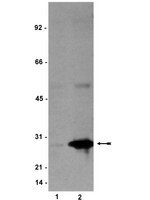MK2 SUMOylation regulates actin filament remodeling and subsequent migration in endothelial cells by inhibiting MK2 kinase and HSP27 phosphorylation.
Chang, E; Heo, KS; Woo, CH; Lee, H; Le, NT; Thomas, TN; Fujiwara, K; Abe, J
Blood
117
2527-37
2011
Show Abstract
Actin filament remodeling regulates several endothelial cell (EC) processes such as contraction, migration, adhesion, and shape determination. Mitogen-activated protein kinase (MAPK)-activated protein kinase 2 (MK2)-mediated phosphorylation of heat-shock protein 27 kDa (HSP27) promotes actin filament remodeling, but little is known about the regulation of this event in ECs. We found that tumor necrosis factor-α (TNF-α) SUMOylated MK2 at lysine (K)-339 affected EC actin filament organization and migration. Loss of the MK2 SUMOylation site (MK2-K339R) increased MK2 kinase activity and prolonged HSP27 phosphorylation, enhancing its effects on actin filament-dependent events. Both TNF-α-mediated EC elongation and steady laminar shear stress-mediated EC alignment were increased by MK2-K339R. Moreover, kinase-dead dominant-negative MK2 (DN-MK2) inhibited these effects. Cell migration is a dynamic process regulated by actin filament remodeling. Both wild-type MK2 (WT-MK2) and DN-MK2 significantly enhanced TNF-mediated inhibition of EC migration, and MK2-K339R further augmented this effect. Interestingly, the p160-Rho-associated coiled-coil kinase (ROCK) inhibitor Y-27632 reversed this effect by MK2-K339R, which strongly suggests that both excessive and insufficient levels of actin filament remodeling can block EC migration. Our study shows that MK2 SUMOylation is a new mechanism for regulating actin filament dynamics in ECs. | | 21131586
 |
Phosphorylation of Ser78 of Hsp27 correlated with HER-2/neu status and lymph node positivity in breast cancer.
Zhang, D; Wong, LL; Koay, ES
Molecular cancer
6
52
2007
Show Abstract
Abnormal amplification/expression of HER-2/neu oncogene has been causally linked with tumorigenesis and metastasis in breast cancer and associated with shortened overall survival of patients. Recently, heat shock protein 27 (Hsp27) was reported to be highly expressed in HER-2/neu positive tumors and cell lines. However, putative functional links between phosphorylation of Hsp27 with HER-2/neu status and other clinicopathological features remain to be elucidated.Comparative phosphoproteomic studies of HER-2/neu positive and -negative breast tumors revealed that Hsp27, one of the identified phosphoproteins, was highly phosphorylated in HER-2/neu positive tumors. The extent of Hsp27 phosphorylation at its Ser15, Ser78 and Ser82 residues were further evaluated with site-specific antibodies in tumor samples by tissue lysate array- and tissue microarray-based analyses, and in the BT474 breast cancer cell line treated with heregulin alpha1 (HRG alpha1) or the p38 MAPK inhibitor, SB203580. The tissue lysate array study indicated that only the level of pSer78 in HER-2/neu positive tumors was more than 2-fold that in HER-2/neu negative tumors. Treatment of BT474 cells with HRG alpha1 and SB203580 indicated that Ser78 phosphorylation was mainly regulated by the HER-2/neu-p38 MAPK pathway. Immunohistochemical staining of sections from a tissue microarray with 97 breast tumors showed that positive staining of pSer78 significantly correlated with HER-2/neu (p = 0.004) and lymph node positivity (p = 0.026).This investigation demonstrated the significant correlation of enhanced phosphorylation of the Ser78 residue of Hsp27 with HER-2/neu and lymph node positivity in breast cancer. | | 17697330
 |
Heat shock protein 27 association with the I kappa B kinase complex regulates tumor necrosis factor alpha-induced NF-kappa B activation.
Park, KJ; Gaynor, RB; Kwak, YT
The Journal of biological chemistry
278
35272-8
2003
Show Abstract
Heat shock protein 27 (Hsp27) is a ubiquitously expressed member of the heat shock protein family that has been implicated in various biological functions including the response to heat shock, oxidative stress, and cytokine treatment. Previous studies have demonstrated that heat shock proteins are involved in regulating signal transduction pathways including the NF-kappa B pathway. In this study, we demonstrated that Hsp27 associates with the I kappa B kinase (IKK) complex and that this interaction was stimulated by tumor necrosis factor alpha treatment. Phosphorylation of Hsp27 by the kinase mitogen-activated protein kinase-activated protein kinase 2, a downstream substrate of the mitogen-activated protein kinase p38, enhanced the association of Hsp27 with IKK beta to result in decreased IKK activity. Consistent with these observations, treatment of cells with a p38 inhibitor reduced the association of Hsp27 with IKK beta and thus resulted in increased IKK activity. These studies indicate that Hsp27 plays a negative role in down-regulating IKK signaling by reducing its activity following tumor necrosis factor alpha stimulation. | Kinase Assay | 12829720
 |










